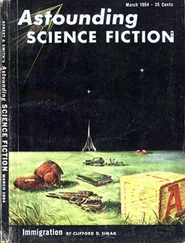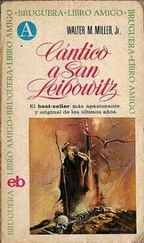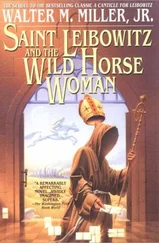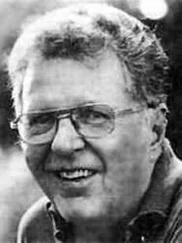After a brief scrutiny, the pilgrim straightened.
“Oh — one of them.” He leaned on his staff and scowled.
“Is that the Leibowitz Abbey down yonder?” he asked, pointing toward the distant cluster of buildings to the south.
Brother Francis bowed politely and nodded at the ground.
“What are you doing out here in the ruins?”
The novice picked up a chalklike fragment of stone. That the traveler might be literate was statistically unlikely, but Brother Francis decided to try. Since the vulgar dialects of the people had neither alphabet nor orthography, he chalked the Latin words for “Penance, Solitude, and Silence,” on a large flat stone, and wrote them again below in ancient English, hoping, in spite of his unacknowledged yearning for someone to talk to, that the old man would understand and leave him to his lonely Lenten vigil.
The pilgrim smiled wryly at the inscription. His laugh seemed less a laugh than a fatalistic bleat. “Hmmm-hnnn! Still writing things backward,” he said; but if he understood the inscription, he did not condescend to admit it. He laid aside his staff, sat on the rock again, picked his bread and cheese out of the sand, and began scraping them clean. Francis moistened his lips hungrily, but looked away. He had eaten nothing but cactus fruit and one handful of parched corn since Ash Wednesday; the rules of fast and abstinence were rather strict for vocational vigils.
Noticing his discomfort, the pilgrim broke his bread and cheese; he offered a portion to Brother Francis.
In spite of his dehydrated condition, caused by his meager water supply, the novice’s mouth flooded with saliva. His eyes refused to move from the hand that offered the food. The universe contracted; at its exact geometric center floated that sandy tidbit of dark bread and pale cheese. A demon commanded the muscles of his left leg to move his left foot half a yard forward. The demon then possessed his right leg to move the right foot ahead of the left, and it somehow forced his right pectorals and biceps to swing his arm until his hand touched the hand of the pilgrim. His fingers felt the food; they seemed even to taste the food. An involuntary shudder passed over his half-starved body. He closed his eyes and saw the Lord Abbot glaring at him and brandishing a bullwhip. Whenever the novice tried to visualize the Holy Trinity, the countenance of God the Father always became confused with the face of the abbot, which was normally, it seemed to Francis, very angry. Behind the abbot a bonfire raged, and from the midst of the flames the eyes of the Blessed Martyr Leibowitz gazed in death-agony upon his fasting protégé, caught in the act of reaching for cheese.
The novice shuddered again. “Apage Satanas!” he hissed as he danced back and dropped the food. Without warning, he spattered the old man with holy water from a tiny phial sneaked from his sleeve. The pilgrim had become indistinguishable from the Archenemy, for a moment, in the somewhat sun-dazed mind of the novice.
This surprise attack on the Powers of Darkness and Temptation produced no immediate supernatural results, but the natural results seemed to appear ex opere operate. The pilgrim-Beelzebub failed to explode into sulfurous smoke, but he made gargling sounds, turned a bright shade of red, and lunged at Francis with a bloodcurdling yell. The novice kept tripping on his tunic as he fled from flailing of the pilgrim’s spiked staff, and he escaped without nail holes only because the pilgrim had forgotten his sandals. The old man’s limping charge became a skippity hop. He seemed suddenly mindful of scorching rocks under his bare soles. He stopped and became preoccupied. When Brother Francis glanced over his shoulder, he gained the distinct impression that the pilgrim’s retreat to his cool spot was being accomplished by the feat of hopping along on the tip of one great toe.
Ashamed of the odor of cheese that lingered on his fingertips, and repenting his irrational exorcism, the novice slunk back to his self-appointed labors in the old ruins, while the pilgrim cooled his feet and satisfied his wrath by flinging an occasional rock at the youth whenever the latter moved into view among the rubble mounds. When his arm at last grew weary, he flung more feints than stones, and merely grumbled over his bread and cheese when Francis ceased to dodge.
The novice was wandering to and fro throughout the ruins, occasionally staggering toward some focal point of his work with a rock, the size of his own chest, locked in a painful embrace. The pilgrim watched him select a stone, estimate its dimensions in hand-spans, reject it, and carefully select another, to be pried free from the rock jam of the rubble, to be hoisted by Francis and stumblingly hauled away. He dropped one stone after a few paces, and, suddenly sitting, placed his head between his knees in an apparent effort to avoid fainting. After panting awhile, he arose again and finished by rolling the stone end-over-end toward its destination. He continued this activity while the pilgrim, no longer glaring, began to gape.
The sun blazed its midday maledictions upon the parched land, laying its anathema on all moist things. Francis labored on in spite of the heat.
When the traveler had washed down the last of his sandy bread and cheese with a few squirts from his waterskin, he slipped feet into sandals, arose with a grunt, and hobbled through the ruins toward the site of the novice’s labors. Noticing the old man’s approach, Brother Francis scurried to a safe distance. Mockingly, the pilgrim brandished his spiked cudgel at him, but seemed more curious about the youth’s masonry than he seemed eager for revenge. He paused to inspect the novice’s burrow.
There, near the east boundary of the ruins, Brother Francis had dug a shallow trench, using a stick for a hoe and hands for a shovel. He had, on the first day of Lent, roofed it over with a heap of brush, and used the trench by night as refuge from the desert’s wolves. But as the days of his fasting grew in number, his presence had increased his spoor in the vicinity until the nocturnal lupine prowlers seemed unduly attracted to the area of the ruins and even scratched around his brush heap when the fire was gone.
Francis had first attempted to discourage their nightly digging by increasing the thickness of the brush pile over his trench, and by surrounding it with a ring of stones set tightly in a furrow. But on the previous night, something had leaped to the top of his brush pile and howled while Francis lay shivering below, whereupon he had determined to fortify the burrow, and, using the first ring of stones as a foundation, had begun to build a wall. The wall tilted inward as it grew; but since the enclosure was roughly an oval in shape, the stones in each new layer crowded against adjacent stones to prevent an inward collapse. Brother Francis now hoped that by a careful selection of rocks and a certain mount of juggling, dirt-tamping, and pebble-wedging, he would be able to complete a dome. And, a single span of unbuttressed arch, somehow defying gravity, stood there over the burrow as a token of this ambition. Brother Francis yelped like a puppy when the pilgrim rapped curiously at this arch with his staff.
Solicitous for his abode, the novice had drawn nearer during the pilgrim’s inspection. The pilgrim answered his yelp with a flourish of the cudgel and a bloodthirsty howl. Brother Francis promptly tripped on the hem of his tunic and sat down. The old man chuckled.
“Hmmm-hnnn! You’ll. need a strange shape of a rock to fit that gap,” he said, and rattled his staff back and forth in a vacant space in the highest tier of stones.
The youth nodded and looked away. He continued to sit in the sand, and, by silence and by his lowered gaze, he hoped to tell the old man that he was neither free to converse nor free to accept willingly another’s presence in his place of Lenten solitude. The novice began writing with a dry twig in the sand: Et ne nos inducas in…
Читать дальше








